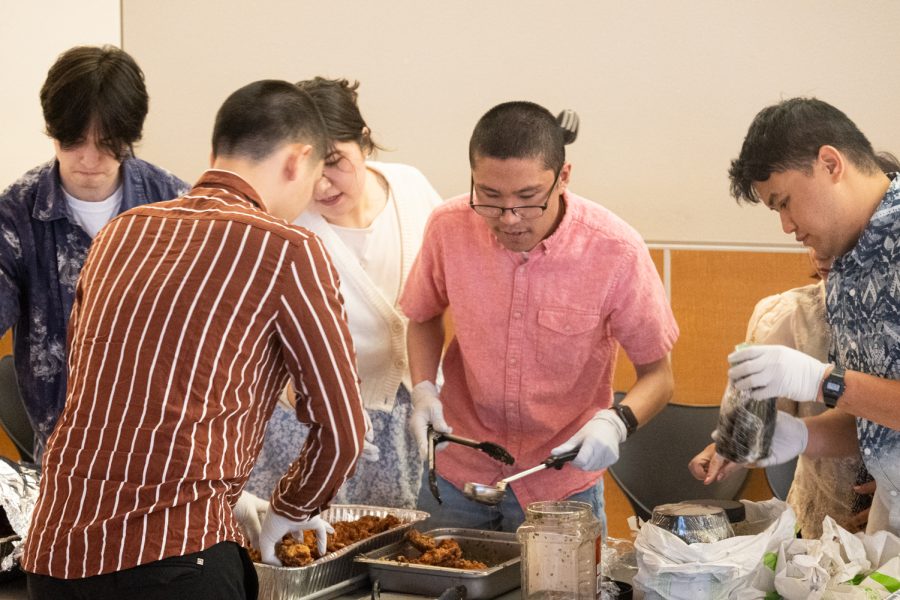Perya night parades Filipino culture
From Pork Adobo to Pinoyz to Men, Perya provided a night of cultural enjoyment
Students are served food at the Filipino Culture Night, March 10.
April 14, 2022
Sunday, the Filipino American Student Association held its cultural night Perya. This event included special cultural dances, singing, food and games.
The first order of business was releasing tables to get their food at the buffet. The food was made at Lumberyard, said Gaire Mamaril, sergeant-at-arms for FASA.
“We just rented out their kitchen. They were generous enough to let us use their space,” he said. “We had all the equipment that we needed, so it was a great place for us to cook our food.”
Mamaril said one thing that really brings out culture is its expression of food. They chose their dishes based on many things. The pork adobo offered comfort, while the lumpia pancit was a finger food convenient for a party.
The night started and ended with Mamaril shouting, “SIGE SIGE SIGE,” to which the audience responded with “FASA.”
Their theme for the event this year was Perya, or in English, “Carnival.”
“It [has] been two years since we last had our FCN [Filipino Cultural Night], and two years ago our theme was ‘Fiesta,’” said Karla Cabling, activities chair for FASA and one of two emcees for the event.
“We had decided that we wanted to be fun and inviting to everyone,” she said. “And everyone knows what a carnival is, so we [made] it to have a little Filipino twist.”
There were nine performances in total: six dances and three songs. Every two or three performances, audience members were called to the stage to participate in games.
These games included a mini relay race where two teams of five had several balloons. Each person had to run around a chair and sit on a balloon to pop it until their team was out. The winning team each won a small Filipino care package filled with snacks.
The dances of the night included Maglalatik, a mock war dance originating from Luzon, Philippines according to the emcees. It mimics the movement of animals and depicts the fight over coconut meat, a highly prized food.
Another cultural dance was Tinikling, a dance that originated on the island of Leyte, Philippines during the Spanish occupation of the Philippines, according to the emcees.
“Rice farmers on the Visayan Islands usually set up bamboo traps to protect their fields, yet the tikling birds dodged their traps,” said Cabling.
Perhaps a less serious but equally fun performance was “Pinoyz to Men,” whose name played off the popular 90s boy band, Boyz II Men.
Pinoy is the shortened colloquial word used to describe people of Filipino descent, according to University of Hawai’i, Mañoa.
The group, “Pinoyz to Men,” danced and lip-synced to “Breaking My Heart” by Mint Condition, with the crowd cheering them on.
Toward the end of the event, a touching slideshow of footage and pictures from FASA general meetings and interviews asking members what “FASA Love” means to them was broadcast to the audience.
“To me, it means a home away from home and a sense of comfort,” said Kalyssa Cutright, president of FASA. “Me, I’m from Hawai’i, so it’s such a small community, and I feel like FASA Love is just feeling accepted no matter where you’re from.”
Cutright also wanted to add that the multicultural community at WSU is very much alive and prospering.
“Everything we do is to uplift each other, and I wanted the audience to see the love we all have for each other,” Cutright said. “I hope this brings more attention to our multicultural community as a whole, and more can be invested into us to support us.”









